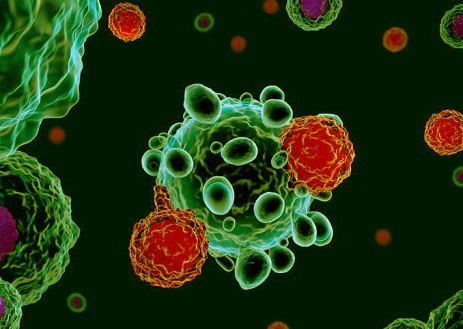T cells are crucial in preventing persistent SARS-CoV-2 infection in the nasal cavity
Nikhil Prasad Fact checked by:Thailand Medical News Team Aug 24, 2024 1 year, 5 months, 1 day, 23 hours, 39 minutes ago
Medical News: Researchers from various esteemed institutions, including Emory University, Washington University School of Medicine, and Saint Louis University School of Medicine in United States, have uncovered critical insights into how our immune system fights SARS-CoV-2, the virus responsible for COVID-19. Their findings, which this
Medical News report will explore, emphasize the importance of T cells in preventing the virus from lingering in the nasal cavity, a key entry point for respiratory infections.
 T cells are crucial in preventing persistent SARS-CoV-2 infection in the nasal cavity
T cells are crucial in preventing persistent SARS-CoV-2 infection in the nasal cavity
SARS-CoV-2, the virus that has caused a global pandemic, primarily spreads through respiratory droplets, targeting the nasal cavity and lungs. While vaccines have been instrumental in controlling the virus, understanding the body's natural immune response remains crucial, especially in light of emerging variants.
The Study's Core Findings
The study used mouse models to delve into the roles of different T cells CD4+ and CD8+ in combating SARS-CoV-2. T cells are a type of white blood cell essential for immune responses. CD4+ T cells help coordinate the immune response, while CD8+ T cells can directly kill infected cells.
The research revealed that both types of T cells are recruited to the respiratory tract after infection. Interestingly, while T cells are necessary for controlling the virus in the nasal cavity, they are less critical in the lungs. This distinction is important because it suggests that the nasal cavity might be a reservoir for the virus if the immune response is inadequate.
T Cells and Viral Persistence
One of the most striking findings was that when both CD4+ and CD8+ T cells were depleted in the mice, the virus persisted in the nasal cavity for up to 28 days. In contrast, the virus was cleared from the lungs even without these T cells. This persistence in the nasal cavity was accompanied by the virus continuing to replicate and mutate, potentially leading to more virulent forms.
The persistence of the virus in the nasal cavity is concerning because it can lead to prolonged infections and may increase the chances of transmission to others. Moreover, the virus's ability to continue replicating and mutating in the absence of T cells could give rise to new variants, complicating efforts to control the pandemic.
Implications for Vaccine Development
These findings have significant implications for vaccine development and public health strategies. Current vaccines primarily focus on inducing an antibody response, which is effective in preventing severe disease. However, this study suggests that enhancing the T cell response, particularly in the nasal cavity, could be key to preventing persistent infections and reducing transmission.
Developing vaccines or treatments that specifically boost T cell activity in the upper respiratory tract might help prevent the virus from taking hold in the first place. Thi
s could be particularly important for protecting vulnerable populations, such as the elderly or those with weakened immune systems.
The Role of Antibodies
Interestingly, the study also found that while antibodies, another critical component of the immune system, are important for preventing infection, they are not sufficient on their own to clear the virus from the nasal cavity. Mice that were depleted of CD4+ T cells, which are crucial for helping the body produce antibodies, had significantly lower levels of virus-specific antibodies. However, even with these reduced antibody levels, the virus was still cleared from the lungs, further underscoring the unique role of T cells in controlling the infection.
This finding suggests that while antibodies can help control the spread of the virus in the body, T cells are essential for clearing it from the areas where it first takes hold, such as the nasal cavity. This dual approach - enhancing both antibody and T cell responses - could be crucial for future vaccines and treatments.
Conclusion: The Importance of a Balanced Immune Response
The study highlights the complexity of the immune response to SARS-CoV-2 and the importance of a balanced approach to vaccine development. By focusing not only on inducing a strong antibody response but also on enhancing T cell activity, particularly in the nasal cavity, we may be able to develop more effective strategies to combat the virus and prevent its spread.
In summary, this research underscores the critical role of T cells in preventing persistent SARS-CoV-2 infections in the nasal cavity. As we continue to battle COVID-19 and its emerging variants, these findings provide valuable insights into how we can improve our defenses against the virus.
The study findings were published in the peer-reviewed journal: Science Advances.
https://www.science.org/doi/epdf/10.1126/sciadv.adp2636
For the latest
COVID-19 News, keep on logging to Thailand
Medical News.
Read Also:
https://www.thailandmedical.news/news/sars-cov-2-reactivates-latent-hiv-and-can-influence-hiv-disease-progression
https://www.thailandmedical.news/news/sars-cov-2-s-spike-protein-causes-host-s-cellular-shift-from-aerobic-to-anaerobic-energy-production-via-ldhb-enzyme-inhibition
